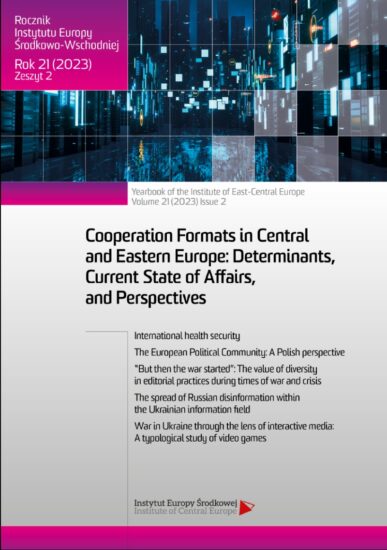Polityka wodorowa w państwach Grupy Wyszehradzkiej. Analiza porównawcza
Pages: 73-90
Edition: Lublin 2023
DOI: https://doi.org/10.36874/RIESW.2023.2.4
Citation method: J. Marzec, The hydrogen policy of the Visegrad Countries: A comparative study, „Rocznik Instytutu Europy Środkowo-Wschodniej” 21 (2023), z. 2, s. 73-90, DOI: https://doi.org/10.36874/RIESW.2023.2.4
Abstract:
The present paper aims to analyse and compare the preconditions for implementing hydrogen strategies in the Visegrad countries. This study attempts to verify that hydrogen policies are going to be implemented at different rates, thereby delaying their introduction. It is extremely important to assert this claim in the context of the energy crisis, the war in Ukraine, and the European Union’s aspirations to achieve low-carbon economy goals and energy self-sufficiency policies at both the national and EU levels. Furthermore, the study attempts to provide answers to the following research questions: firstly, does the hydrogen policy have a realistic chance of being implemented in the Visegrad region? Secondly, will it be implemented in the indicated form and extent of cooperation?
Bibliography:
1. Black Horse, https://h2v.eu/hydrogen-valleys/black-horse.
2. Błach-Morysińska K., Tchorek G., Mapa rozwoju rynku i technologii dla obszaru technologii wodorowych, PARP, Warsaw 2022.
3. Doliny wodorowe w Polsce, https://h2poland.eu/pl/kategorie/doliny-wodorowe/odbior-spoleczny/doliny-wodorowe-w-polsce/.
4. European Commission, Communication from the Commission to the European Parliament, The European Council, The Council, The European Economic and Social Committee and the Committee of the Regions, REPowerEU Plan {SWD(2022) 230 final}.
5. European Commission, 2020. Communication from the Commission to the European Parliament, The Council, The European Economic and Social Committee and the Committee of the Regions, A hydrogen strategy for a climate-neutral Europe, Brussels, 8 July 2020, 301 final.
6. Gołębiowska M., Paszkowski M., Szacawa D., Neutralni dla klimatu: zielona transformacja państw Europy Środkowej w dobie pandemii COVID-19, “Prace IES” 2021, no. 15.
7. International Energy Agency, Hydrogen, 2022, https://www.iea.org/reports/hydrogen.
8. International Energy Agency, Hydrogen – more efforts needed, 2023, https://www.iea.org/reports/hydrogen.
9. International Energy Agency, The future of hydrogen, 2019, https://www.iea.org/reports/the-future-of-hydrogen.
10. Janiček L., Reichmann L., Hydrogen law, regulations & strategy in the Czech Republic, https://cms.law/en/pol/.
11. Kochanek E., The role of hydrogen in the Visegrad Group approach to energy transition, “Energies” 2022, vol. 15, no. 19.
12. Niewiński P., Critical Infrastructure at Sea and the Energy Security of the Republic of Poland, “Energy Policy Studies” 2022, vol. 2, no. 10, pp. 3-14.
13. The Government of Poland, Polish Hydrogen Strategy Until 2030 with an Outlook Until 2040, 2021.
14. The Hungarian Government, Hungary’s National Hydrogen Strategy. Strategy for the Introduction of Clean Hydrogen and Hydrogen Technologies to the Domestic Market and for Establishing Background Infrastructure for the Hydrogen Industry, 2021.
15. Todorović I., Czech coal regions to introduce hydrogen technologies, Balkans Green Energy News, https://balkangreenenergynews.com/czech-coal-regions-to-introduce-hydrogen-technologies/.
16. Trubalska J., Slovakia – case study, [in:] A. Wiącek, M. Ruszel, J. Stec-Rusiecka (eds.), Energy security. Selected issues, Rzeszów 2022.

PDF: Download